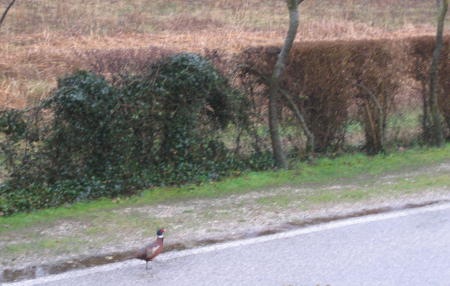Buon Natale
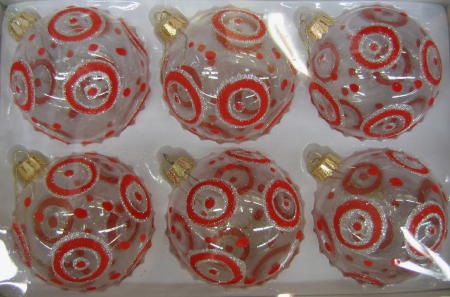
“Auguri, Best wishes!
“Auguri.” Giancarlo solemnly shook my hand as we stepped into the kitchen. His eyes lit up at my red 60’s era beaded sweater as I, ignoring decorum, gave him a kiss on both cheeks. It is Christmas after all.
“It is certainly a party with that sweater, Pulcina!” I wanted to explain that it has been compared to something Tonya Harding might wear, but it was too complicated, so I just thanked him as we took our seats at the table. Christmas Day, 2008. I sat in the seat that I had been assigned almost six years ago at the table covered with a red tablecloth stamped with candles. Anna Maria was particularly pleased with it since it did not show wine stains. She sits in her spot across from me, leaving the space to her left where la Nonna used to sit, open. This space is never occupied, even when guests come for a meal. We squish together, shift chairs, but keep that space open.
~~~
“Luciano, where did you sit before I arrived?”
“In the same place, but more in the middle. Do you want to move?”
“Where would you put me? What would happen if we switched places?”
“I like where I sit. I think your place is good for you. You are more in the middle of the action. Why do you want to move?”
“I don’t. It was your idea.”
“Why don’t you stay there?”
“Ok.”
~~~
We drank a toast to Christmas and Anna Maria disappeared to fetch the main course, which has always been and will always be, Zampone. It lay, as usual, glistening alarmingly naked on the platter, a boiled pig leg stuffed with sausage, complete with toes that point to the sky. With little ceremony, she sliced it up, carefully removing the gelatinous skin from my serving and adding it to Luciano’s plate. On her plate she placed all the toes; she loves to suck on the bones, and once a year, why not?
I asked about the pig legs.
“Do they use all four legs to make Zampone?”
“Yes, the back legs are a little longer, but that must be for bigger portions.”
“And they remove all of the bones and put in the sausage.”
“For flavor.”
“And then they put the leg back together.”
“Yes.”
It still seems like a gruesome practice…something akin to Frankenstein, a tad less peculiar than assembling a turducken. Yet this year it seemed normal, not even noteworthy. Perhaps the only noteworthy change is that this year I made my first attempt at cooking one of the sausages that ultimately go into those legs. It is called a cotechino and, when not inside a pig appendage, must be boiled.
“But you need to use a little shirt,” Anna Maria advised. “Wait, I will lend you one.” With that she disappeared into the kitchen.
“A shirt?” I looked at Giancarlo.
“Yes, and a little tie and a belt.” His eyes were smiling and before I could clarify, Anna Maria returned with a little string casing, a shirt, for the sausage. 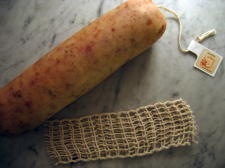

“Put it in this and cook it for one hour and a half. Change the water halfway through.”
I followed the directions to the letter, but it just was not as good as hers, filled with hard little pieces of, I think, fat. So I will leave this dish to her, as normal.
In fact everything this year seems so normal. Is it possible that I have gotten so used to Christmas in Mareno di Piave that I cannot find anything unusual to report? Anna Maria and Giancarlo’s tidy, tree-free house sports subtle Santa Claus figurines on the television. Luciano and I moved our four-year-old lopsided Christmas tree into the house from the garden without comment and decorated it with my odd collection of ornaments that finally made its way from Berkeley. And at lunch Luciano sat in the chair he has sat in since he was born, displaced a few feet by the newest addition to the family, me.
After lunch on Christmas Day I went for a walk. It had snowed the night before, a fragile gift that had lasted all day despite the sun, and the grim edges of winter in the countryside were softer. In the silence of the afternoon every sound was magnified. A flock of tiny birds lifted as one unseen whirring beast behind a tall hedge at my passing, only the beating of hundreds of wings vibrating the leaves giving away their shocked departure.
The white peacocks that always appear from the fog in the most mystical of moments were out in broad daylight, strutting around like barnyard chickens in the frozen furrows of the neighbor’s cornfield. One of them had appeared to have had babies since a file of small brown birds followed her closely. I imagine they will blossom later.
A ramrod straight gentleman passed me on a bike, dressed in a dark suit and fedora. I have seen him before but I don’t know to which family he belongs. He looked to be about eighty as he tipped his head in a Christmas salute, “Auguri.”
“Auguri,” I replied. He cruised on down the street as I turned back onto our little lane. It is all so calm, so normal. It is as it always was.
As I sat at my computer today trying to pry loose an observation of Christmas I noticed an unusual structure in the field across the lane. It seems that our campo, our open space, our receiver of failed bread attempts and dead potted plants has been selected as a location for a panevin, or one of the colossal bonfires that appear in empty fields, sometimes alarmingly close to houses and major roads. These structures that rise sometimes more than 30 feet into the sky, are lit on the night of January 5, the Epifania, to celebrate the new year and a successful harvest and in hopes of a good year…or lots of pane and vino.
Normally we have to travel a few kilometers to watch this (for all intents and purposes, pagan) ritual in front of our church in Soffratta where I am always struck by the contradictions of the event. Now, it seems, I can just look out my window and watch as a bunch of farmers build this barely legal structure out in the prickly scrub.
It is currently about ten feet high, a messy support structure of old boards and, it seems, a few chairs. A pile of wine cutting sits ready to be added. I am struck by the fact that I knew exactly what it was when I saw it and, even though one has never been built in the field before, not only were Anna Maria and Giancarlo not surprised by its appearance, neither was I. Imagine if a few guys started to build a bonfire the size of a three story building in the backyard in Berkeley to celebrate the harvest? Here, my sighting didn’t even merit a comment.
For my part, I am delighted to have a new aspect of Christmas on which to report. What fun! These guys have about ten days to pull this thing together as I sit at the window with my binoculars and camera. Perhaps I will even wander over and ask a few questions such as if they had asked the owners of the field (who live conveniently in Milan) if they could put a match to an incendiary device on their land…
No, maybe not.
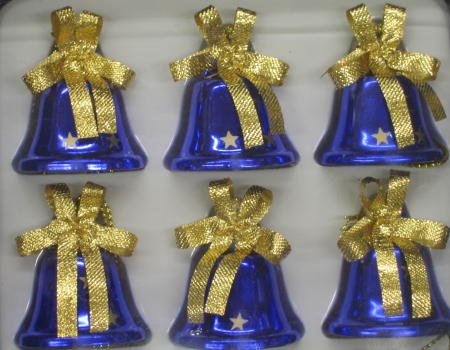
Waterworld
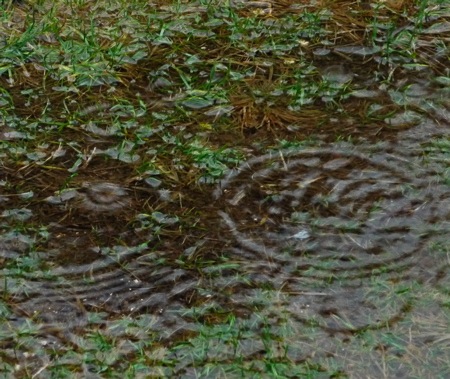
It has been raining nonstop for nine days. Yes, the rhythm has changed, sometimes in the form of light misting wafting towards the ground, sometimes in angry sheets tearing across the ragged soggy fields. Yet, the rain does not stop. How could there be so much water in the sky?
Conegliano smells like an aquarium as I trot through the ankle deep puddles from my clammy car to the school. The entrance, with polished marble floors is now a slick water hazard, a lawsuit that will never happen. I grab the stair railing. Umbrellas left in a pile outside the door, slowly drip onto the floor like gangly discarded cormorants. Rain splashes against the north facing windows as if that corner of the building were plowing though an angry sea. I turn on the calm, yellow lights that bathe everything in a warm glow and wait for students to straggle in, wet and sputtering, yet driven as usual to learn English. The rain does not seem to slow them down.
Having come from drought-prone Berkeley, I watched in alarm as Luciano pushed the start button to the dishwasher with clearly only half a load.
“Wait, we can fit more…let me check!”
“Serena, our water bill for this month was three euro. Three euro. That is less than a cup of coffee.” He pushed the start button, giving me the “get a grip” look.
He is right. There is water everywhere, in deep sticky, puddles in what was once my garden, in pools on the doctor’s garden tarp, and in angry brown torrents of the Piave River which seems to have become a major character this season.
Venice is making the headlines with the waist deep aqua alta which comes and goes every year. The Venetians are used to it, with wading boots available for sale, high water alarms and elevated walkways that had I once thought were benches thoughtfully put out for me to rest my weary feet. The tourists who gleefully wade through this water which has, before arriving in the narrow alleys and hidden piazza, washed across acres of grimy detritus laden cobblestones, are wading through a soup of unimaginable contents. The inhabitants resignedly get out the sump pump and pull on the boots. No Venetian thinks it is charming.
The rain beats on the bathroom roof, with the shutters closed against the horizontal water coming from the east. It feels as if I am drying my hair under a waterfall…I worry about electrocuting myself.
Rome, on the other hand, is floundering itself into ruin with all the rain. Inhabitants are warned to stay home by a reporter who stand in the rain with a microphone (again I think about electrocution) with swarms of Romans behind him, jostling one another to get the best cell phone shots of the swelling Tiber River. A woman failed to notice that the water level was above the windows of her car and drove into an underpass, where she drowned during rush hour traffic. A barge pilot, in a case of poor judgment and, well, being Roman, attempted to continue up the river with his cargo. Miscalculating the distance between the bottom of a bridge and the newly risen surface of the water, his barge stuck fast, where it remains slowly and publically being crushed in the rising water.
I stood in the galley of my submarine kitchen, cooking an egg as the rain pounded against the shuttered window. I wondered what time of day it was.
Saturday morning quite suddenly it stopped raining. I blinked for a moment at the momentarily dry skies, and then began opening the shutters to let in some unfamiliar light, stretching my eyes in the process.
As I opened the windows, I heard a strangely familiar bell, slight, tinkling with movement. What was it? SHEEP! They were coming down our street…a river of dirty, white wool led by a herder and three horned goats. Giancarlo yelled with rage as he burst out of his door, and I ran downstairs to help. Grabbing an umbrella I ran out to defend our gardens. Anna Maria stood weaponless by her front gate, swinging her arms. I wondered briefly if she could be knocked down, like a holiday shopper, but she looked steady so I ran to the garden on the other side of the house.
Sheep are opportunists and, as they travel, anything remotely green is a meal. A furled umbrella is not much of a deterrent. In fact, as I ran back and forth in the mud swinging with all my might at the backsides of these beasts, they only reluctantly moved on, more from the momentum of being a member of a group of two thousands than from any harm I inflicted. Nevertheless for what seemed like forever, I ran back and forth with that umbrella protecting my boxwoods, then the lavender, then Giancarlo’s ivy, from the warm-blooded locusts flowing down Strada Nuova. Then, suddenly, there were only babies. I hesitated, not wanting to hurt the lambs. One got confused and ended up inside the parents’ garden. Anna Maria toyed with closing the gate, but it skittered out and joined the flock. The second sheepherder and his dog brought up the rear.
I stood, trying to catch my breath with my umbrella at my side, and glared at him. He looked at me without interest, flipped his whip at the last of the straggling babies and shuffled down the street, now strewn with sheep poo, mud and blood. Perhaps one of the dog’s had been overzealous, but the swath of destruction was depressing beyond words. I washed some of the evidence off the terrace. It began to rain again.
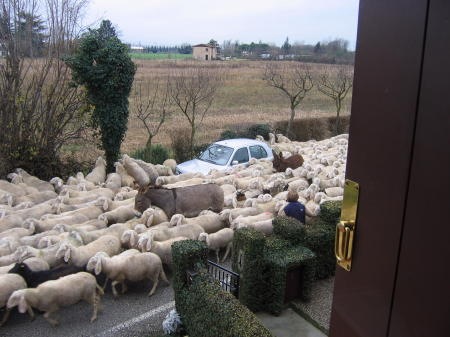
Luciano arrived later and, exasperated, commented that it was a good thing he had not been here as he would have used a more dangerous tool than an umbrella.
Just now, as I write this story, a pheasant strode past our house. The bird strolled along Strada Nuova, the warm rich colors of his feathers glowing in the driving rain, on a little afternoon passeggiata. This has made me feel better and now I think I can face going out…but will pay close attention to any underpasses.
